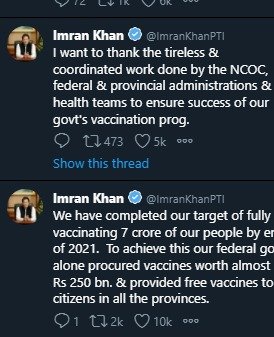NCOC green lights vaccination of children aged 12 and above
Asad Umar says special vaccinations drives to be run at schools for easy access
The government has decided to inoculate children aged 12 years and above against the coronavirus in a bid to build herd immunity against Covid-19.
In a tweet, Planning Minister Asad Umar said that the National Command and Operation Centre (NCOC) has decided to "start vaccination of all 12 years and older".
Umar, who also heads the NCOC, said the government will send vaccination teams to schools to administer jabs in order to make access to vaccines easier.
Read Covid curbs relaxed in 18 hotspots
A day earlier, Interior Minister Sheikh Rashid said that the government had administered vaccines to over 70 million while NADRA had issued 7.5 million vaccination certificates.
In a bid to encourage people to get vaccinated, Rashid had warned of further restrictions on non-vaccinated citizens from October. He had said that several restrictions would be imposed on citizens who failed to receive their second dose of the anti-Covid vaccine by September 30.
He had not specified restrictions planned for such individuals. However, in August, NCOC head Asad Umar had announced that Pakistan Railways would only allow vaccinated individuals to travel by train from October 1.
Similarly, all local and international air travellers will be required to be fully vaccinated by the end of September or they would not be allowed to travel. Meanwhile, from September 30, shopping malls, hotels, restaurants and wedding venues will only be accessible to fully vaccinated people.
Fake certificates
As Pakistan steps up drive to vaccinate more and more citizens, it is faced with another challenge -- fake coronavirus certificates. Experts fear that if left unattended, this could be the hole that ultimately sinks the ship of Pakistan’s fight against Covid-19.
The first case of nature came to light on June 14, when dozens of people were found to have acquired fake vaccination cards from the city’s biggest government vaccination facility at the Karachi Expo Centre.
In a bid to stop this practice, the NCOC issued directives to the law enforcement authorities to take action against the people involved in making forged certificates.
A day ago, the Federal Investigation Agency (FIA) arrested 41 people over the issuance of the fake certificates and registered cases against them.
Read more Pakistan crosses 30 million vaccinations mark, says Umar
The move came after "fake entry" of Covid vaccination was found in the government portal under the name of former prime minister Nawaz Sharif, who left Pakistan for the United Kingdom in Nov 2019 — months before the first case of the virus was even found in the country.
Subsequently, the Punjab health department suspended medical superintendent Dr Ahmed Nadeem and senior medical officer Dr Munir Ahmad of Kot Khawaja Saeed Hospital over the negligence, directing them to submit a report to the department.
According to whistleblowers on microblogging site Twitter, immunisation certificates can be forged for anywhere between Rs2,000 to Rs10,000 at major government hospitals, depending on the value of the vaccine.
Vaccination target
Last month, Parliamentary Secretary for National Health Services Dr Nausheen Hamid said that Pakistan was on its way to vaccinate almost 80 million of the country against the novel coronavirus till the end of December 2021. “Our target was to vaccinate 70 million Pakistanis by the end of this year that is now increased to 80 million. With the support of people, we will soon achieve this target,” she had said.
In order to meet this target, the government is mostly using Chinese vaccines -- SinoVac, Sinopharm, CanSinoBio -- donated by Beijing.
Last month, Chinese envoy to Pakistan Nong Rong said that China had listed Pakistan as its priority in COVAX -- a worldwide initiative aimed at equitable access to vaccines.
As a member of COVAX, Pakistan has also received vaccines from the United States as well. The US has donated at least 15 million Pfizer vaccines to the country so far. The last batch of 3.5 million Pfizer vaccines was sent earlier this month.
At the start of this month, Russia sent its first consignment of one million doses of Sputnik V coronavirus vaccine. Pakistan had asked Russia to send 5 million vaccines to the country in June this year.
https://tribune.com.pk/story/2322343/ncoc-green-lights-vaccination-of-children-aged-12-and-above?_gl=1*1cdmocs*_ga*YW1wLWVaa0lBOG0wRk1ybGE2QjVVUXd1TUs5X2RoMWxwd2RCMHZFeS1HVnpTSTdlOXdJV19VSmJRbzRROVktUFZYUlI







